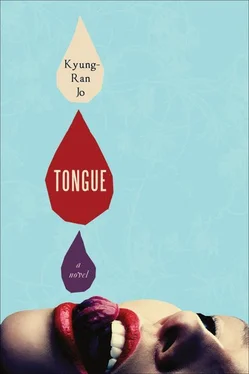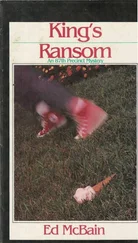I feel Mun-ju staring at my forehead.
“I told you that you should take some time off until spring before starting work again. You look so drained.”
When I told her I was going back to work at Nove, Mun-ju wasn’t too happy about it. She wanted us to take a trip together, even somewhere close, but I didn’t want to. I didn’t want to go anywhere. Now I feel most relieved and carefree when I’m in the kitchen. What I need now isn’t rest, but labor.
“In the old days, farmed vegetables like radishes and carrots pulled themselves out of the ground in the early morning. They’d go in front of the farmer’s house and stand in a single line, waiting for the farmer to pick what he needed. But one day the farmer was so hungover that he couldn’t get out of bed, so he asked the vegetables to come back tomorrow. When this kept happening, the angry vegetables notified the farmer, Now we’re just going to stay rooted underground. When you need something, you come and pull it out.”
“That’s not even remotely funny.”
“They say that was the beginning of labor.”
“So then you must know how the idea of rest came about?” Mun-ju retorts, in no mood to laugh over my story.
“I need to work like this so I can do things in the spring that can only be done then.” I clasp my fingers together and stretch them over my head as if I’m planning to climb the mountains in the spring to pick wild rocambole and fatsia shoots and aster.
“Just push it out of your mind. I mean, what can you do at this point? At least you guys never got married. At least he has a conscience, leaving you that house without any hassle.”
It wasn’t without any hassle, but, as Mun-ju says, it wasn’t as if we were married. But there’s something I can’t give up, something that isn’t the house or the bank accounts.
“Mun-ju.”
“Yeah?”
“I’m fine.”
“Okay.”
“Really.”
“Okay. You’re fine.”
I am suddenly ravenous, even though it’s after eleven P.M. I want to slice into a thick steak, seasoned with only salt and pepper.
THE LAST THING Uncle gave me before he left was a half-transparent rock the size of a man’s fist. I studied the rock, the surface of which was engraved with a faint pink saw-edged pattern, like a rose quartz. It felt stony and alien—perhaps it was a piece of meteorite from a planet that broke off into my hand. Depending on the light, it sparkled mysteriously of green and pink and transparent white, and I thought it was speaking to me in a new language. Uncle corrected me, telling me that it wasn’t a shard of rock, but rock salt harvested from a salt mine. He bought it at a mining village in Catalonia, Spain. Unable to believe that this large rock, as firm and beautiful as a top-quality diamond, was salt, I touched my tongue to its surface. Gradually, saltiness spread in my mouth. It felt as if I’d put at the center of my tongue a grain of sea salt, evaporated by sunlight and obtained after a laborious process; it was that kind of feel-good saltiness. I placed that rock salt on a saucer and put it on the windowsill next to the row of basil, lavender, thyme, rosemary. As Uncle observed, the rock salt was alive. On sunny days it shot out brilliant rays so strong that it blinded you, and when it rained white salt crystals appeared on its surface. Like a small, sensitive animal, the lump of salt seemed to breathe in and out.
Uncle told me a story, a French folk tale, the day he gave me the rock. A long time ago, a princess told the king, “I love you as much as I love salt.” Believing it to be an insult, the king banished his daughter from his kingdom. But after a long time, the king realized the value of salt and the depth of his daughter’s love for him. I smiled ruefully. Was it because, as a grown woman, it felt pointless to talk about things like this with Uncle? Or was it because I already knew what Uncle was trying to say? I said, So, Uncle, you love me as much as you do salt? in an attempt to make him laugh. But Uncle didn’t crack a smile. We were thinking of the same person, our faces rigid. I wished I had pockets full of funny stories, but all I had was a knife.
Uncle had gone to Spain on a two-month-long honeymoon. The day after he gave me the salt, he was admitted to a hospital in Icheon, in Gyeonggi Province. It was his decision, but it had taken a long time for him to reach it. Sometimes I’m afraid I won’t remember her name , Uncle said, his voice choked. She was once my aunt—it was unbelievable that he sometimes forgot what her name was. Uncle suffered from Korsakoff’s syndrome, brought on by alcoholism.
The rock salt isn’t getting any smaller.
One morning after a rainy night, I stand by the window, staring at the white crystals on the rock, then call in to take the day off and board the bus to Icheon. Uncle doesn’t like it when I visit, but it’s my duty as his guardian, as recorded on the hospital forms. Will he feel a little better if I tell him there’s no such thing as dead salt, that his beliefs are wrong? As we merge onto Jungbu Highway, the raindrops, mixed with snow pellets, slash across the windshield.
Uncle’s the one who told me that salt wasn’t just a mineral, but Chef’s the one who taught me salt’s abilities. Salt retains vegetables’ vivid colors when parboiling, removes astringency from salad greens, freezes ice cream, quickly cools boiling water, maintains the freshness of cut flowers, removes stains on clothing, alleviates pain in your neck, is an ingredient in soap. But the most important thing salt can do is cure fish and meat. Without salt, they’re the first to go bad. During the salt-curing class, Chef brought out a small, oily herring with a single dorsal fin and a split tail. The herring is washed, its stomach is sliced, its innards removed. It’s washed again, then a fistful of salt is sprinkled all over it. When moisture breaks through the surface, the tail of the fish is grabbed and it’s shaken in the air once, followed by another liberal sprinkling of salt. No matter how much herring you have, all of this must be done in half a day. Herring is oily, so you can maintain its freshness only if you salt it within two days of capture. Since it has to go through distribution channels, once you have a herring in your hands, the first thing you have to do is quickly salt it. Salt is a blessing as well as an instrument that supposedly wards off evil, used in a ceremony where one places a grain of it on a baby’s tongue. If cooks are given a not-so-stellar ingredient, first they salt it, then they figure out what to do with it.
During my stint at Won’s Kitchen, I made food for photographic purposes, to accompany interviews with newspapers and magazines. I was often asked which ingredient I most cherished, and every time I would open the wine cooler next to my oversized refrigerator and show them. When we built this kitchen, we’d poured our hearts and souls into the U-shaped marble counter with a hole cut in the middle, through which I could sweep in garbage—but the items I chose with the most deliberation were the fridge and the wine cooler. They were also the most expensive. I kept my salt in that wine cooler.
Grandmother used to say that the taste that came from the hands was the most important element in cooking, that this flowed from the sincerity of the cook, but in my case the most important thing was seasoning the food adequately with salt. Even when salt is only slightly dried out, the important minerals vanish and its taste and scent change. Like wine, it’s important to keep it in a place that maintains the perfect level of humidity and temperature. If I had to choose only one seasoning, it would obviously be salt.
But like Chef said, the trend of cooking everything with “a slight sprinkling of salt,” in vogue when he started cooking, has passed. If I were to divide the cooks these days into two categories, it would be cooks who don’t use salt and cooks who do. Chef is in the latter category. On Nove’s special menu, there’s sea urchin topped with caviar, and when that dish is served, Chef spreads a thick layer of coarse sea salt on the bottom of a big, half-transparent blue salad bowl, on top of which he places the sea urchin in its shell and a teaspoon. Chef pours the salt into the bowl not purely for decoration but for the diners to dab the sea urchin in—but none of the customers, who now believe that salt is bad for their health, dip the sea urchin in salt. Without that saltiness, eating sea urchin is the same as eating a saltless anchovy. People are attracted to salty foods because of a fundamental biological shield against salt deprivation. The day before the launch party for my cooking school, Chef brought over a jar of transparently bright salt and three loaves of bread baked with only olives, yeast, and salt—maybe Chef wanted to convey to me the significance of this mineral.
Читать дальше












